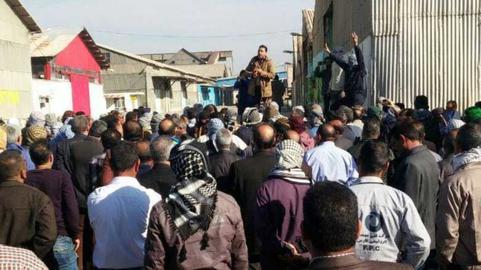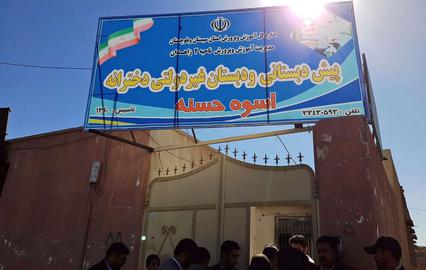Ali Naqdi felt that this was his only solution. On February 27, 2018, after a long period of protesting for the most basic right (receiving his wages), the Haft-Tappeh agribusiness worker committed suicide. He had told his colleagues of his hope that this desperate act would bring attention to the plight of the Haft-Tappeh workers.
This harrowing tale opens a 40-page report published by the Iran Human Rights Documentation Center (IHRDC) on December 14. The US-based group’s report, an extensive review of Iran’s labor code and the almost 40-year history of the Islamic Republic’s suppression of labor activism, was published in English under the title: “Controlled and Persecuted: Labor Activism in Contemporary Iran.”
The report couldn’t be more timely.
“With the tough economic conditions, protests are everywhere,” Shahin Sadeghzade Milani, the IHRDC’s legal director, tells IranWire in a phone interview from his base in New Haven, Connecticut. “Workers are regularly not paid and protests are everywhere.”
Milani has a point. Haft-Tappeh is located in the strategic Khuzestan province in the southwest of the country. The province contains almost all of Iran’s oil and gas reserves, yet it is mired in poverty. Not far from Haft-Tappeh, in the provincial center of Ahvaz, steelworkers have led strike action and protests for more than a month. As I began writing this on December 19, the city was reportedly filled with police and security forces.
The slogans workers chanted in Ahvaz are similar to those used by Haft-Tappeh workers. They demand an end to the privatization of the steel company and are asking for it to be re-nationalized. They also demand the release of arrested workers and the payment of back wages.
The IHRDC report shows that, since its foundation in 1979, the Islamic Republic has routinely responded with police action. (The pre-revolutionary Pahlavi regime was also no friend of workers' rights, with a long history of suppressing strikes.)
Milani, who says the report represents a year of research and analysis, includes interviews with worker activists from different eras of the Islamic Republic. Sadeq Kar remembers getting arrested for publishing statements in solidarity with Turkish trade unionists in the wake of the 1980 coup there; Mahmoud Salehi and Mansour Osanlou are names better known to those who follow contemporary Iran. They respectively organized bakery workers in Kurdistan province and bus drivers in Tehran. Salehi remains in Iran, while Osanlou had to flee Iran after arrest and torture.
I ask Milani about the problems with Iran’s labor code.
“One major problem is that it allows the government to exercise effective control over workers’ organizations,” Milani says. ”We have explained in detail how is this done. For instance, to be elected to the board of Islamic Labor Councils, candidates are required to believe in Islam and the country’s Supreme Leader and they have to be vetted by the labor ministry first.”
“In other words, none of these officially-recognized workers’ bodies are independent,” he adds.
Even the existing protections often don't apply to many of the workers since they are on temporary contracts. According to Milani, official statistics count 84 to 90 percent of workers as being on temporary contracts.
“This totally destroys their bargaining power,” Milani says. “If you want to file a grievance against the employer, your contract is finished before you get to the courts.”
The reason behind most worker action in contemporary Iran is quite shocking: non-payment of wages. The report counts no less than 1,257 wage-related workers’ actions in a period of 23 months (January 2017 to November 2018). The protests happen all over the country and most of them don’t make mainstream news. The examples are diverse: contract-based oil workers in Abadan; staff at the Prophet Mohammad hospital in the Persian Gulf island of Qeshm; water-carriers in Lande county, part of the tiny, mountainous Kohgiluyeh and Boyer-Ahmad province (who have contracts with the state water company); fire-fighters in south-central Kerman province’s South Rudbar county.
Milani says that workers’ issues are often absent from the mainstream.
“Iranian workers don't get enough attention. Workers don't have any special interest groups following up on their cases,” he tells IranWire. “Their demands are often not explicitly political so they don’t make the news. They don’t usually belong to a specific religious minority.”
The report calls on Iran to fulfill its international obligations. Milani says Iran should allow trade unions to form and bargain. The government should stop arresting workers’ activists and wages should be paid, according to Iran’s obligations to the International Labor Organization conventions.
The IHRDC report is mostly based on data derived from protests documented by Iran’s own official news agencies, Milani says.
Over the last 40 years, Islamic Republic officials have often claimed to speak for the “dispossessed.” But the regime’s record as one of the worst violators of workers’ rights in the world tells a different story.
visit the accountability section
In this section of Iran Wire, you can contact the officials and launch your campaign for various problems

























comments